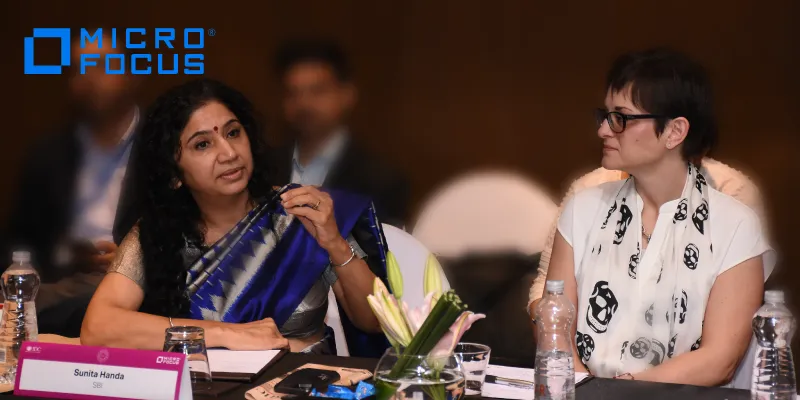1576576513439.png)
Micro Focus
View Brand PublisherHow Sunita Handa, the first woman to head IT Channels and Operations for SBI, breaks stereotypes
The Kanjeevaram-clad, bindi-wearing Sunita Handa breaks the sartorial stereotypes that often come with being a techie.
Her advice to young girls aspiring for success in the field is, “Do not try to be a man to be successful. Have your own style of management. As long as excellent work is delivered, no one is looking for men-like traits in you. You don’t need to look, dress or behave like a stereotypical techie,” she says
Sunita, the Chief General Manager (IT_Channels & Ops), State Bank of India (SBI) says the recipe for success has two main ingredients - hard work and upskilling. However, when it comes to women, they require an additional ingredient - rising above stereotypes. Sunita holds the distinction of being the first woman to hold the CGM (IT) position in the bank’s 200-year-old history - and she attributes her climb up the ladder to hard work, not hardships, thanks to her father.

From left: Sunita Handa , Chief General Manager (IT_Channels & Ops), State Bank of India and Genefa Murphy, CMO, Micro Focus at the Women in Technology panel in Mumbai.
“For no hardships, the credit goes first to my father, who let me go ahead with my interest in Maths and Computers, despite people telling him that Computer Science is not “feminine”, or that Science students are “under-social”, or that women are poor risk takers and don’t do well in trial and error world of tech,” Sunita tells YourStory.
She also doffs her hat to SBI and the fact that the top leadership didn’t find any reason to believe in the oft-quoted myth that women can be good only at soft skills, but not technical ones.
Steady climb to success
Starting her banking career as a Probationary Officer with SBI, Sunita has over three decades of rich experience in various spheres of banking like Operations, HR, Digital for Corporates & Retail etc. She was part of SBI’s Core Team that spearheaded the digitalisation of its foreign operations. She later worked as Senior Vice President (Technology & Ops) at the bank’s Frankfurt (Germany) Office.
However, there is no taking away from the hard work put in by Sunita herself. She attributes it to the clarity she had about the things she wanted to do, being ready to take on hard work, working twice as hard as her male counterparts to achieve the same success, promotions and elevations, without spending time pondering the ‘why’ of it.
Sunita, who was invited to speak at a panel discussion on Women in Technology by Micro Focus in Mumbai last month, emphasised that one of the most crucial challenges for working women is returning to work after a maternity break or a sabbatical, often made difficult because of the lack of support from their organisation, or failure to catch up with work or adjusting to changing work scenarios.
“Such situations call for a need to have certification courses that women can pursue when at home or on a sabbatical or maternity leave to upskill. It is important to invest in girls, and to train, teach and upskill women in the workforce,” she says.
Genefa Murphy, CMO, Micro Focus, agreed with Sunita, drawing from her own experience of keeping up with some work while she was on maternity leave. “People would be surprised to see me responding to emails during my maternity leave, but what’s wrong with that! I made the choice to continue to develop myself while on maternity leave, because I had a passion for my job, not out of fear of losing my job. I controlled my narrative.” Acknowledging the point of view put forward by Sunita, Genefa said it was encouraging to see leaders having such clarity of vision on the panel.
Being bogged down by stereotypes, myths and social convention that a career in technology is not suitable for women is hazardous, Sunita said at the event, and is detrimental to the growth of women in tech.
“It is incredibly important to overlook the typecasting or stereotypes, and make decisions based on facts and personal observations, rather than the baseless beliefs other people pass on to you.”
The onus is also on educational institutes to keep boosting the confidence of their girl students by interfaces and interactions with mentors and role models along with quality career counselling. Lastly, choosing the correct life partner also plays a crucial role in the way women can climb the professional ladder, Sunita said, emphasising on the importance of a support system.







